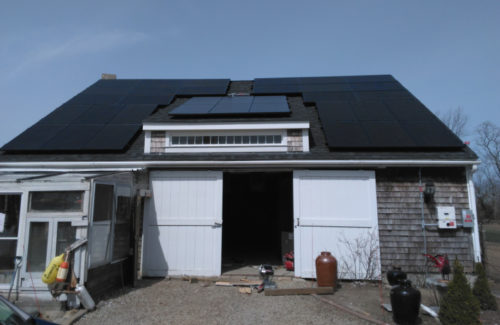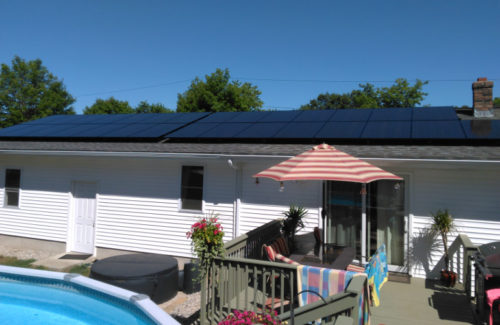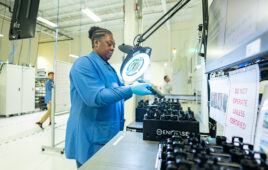Sunwatt Solar may be headquartered in the country’s smallest state, but it’s making a big impact on the area’s communities.
Founded in 2014 in Pawtucket, Rhode Island, Sunwatt mostly does residential projects in its home state and Massachusetts, but its small-commercial focus is growing.
 “We were 95% residential; now we’re about 80% residential and 20% small commercial,” said Dana Weinberg, inside sales and marketing director. “We’re seeing a lot of commercial opportunity [with] businesses that didn’t really understand they could go solar. It’s really been catching on.”
“We were 95% residential; now we’re about 80% residential and 20% small commercial,” said Dana Weinberg, inside sales and marketing director. “We’re seeing a lot of commercial opportunity [with] businesses that didn’t really understand they could go solar. It’s really been catching on.”
A pillar of Sunwatt’s brand awareness is educating communities past “Solar 101” and diving into the logistics on how to install and understand incentives.
“It’s less education on how solar works now and more education on how the incentive programs work, what the policy is, what the rules are on the utility side,” Weinberg said. “We always handle a lot of complicated projects because we’re small and able to take the time to understand if they can be done, how they can be done. We’re always looking to get different members of the community who probably didn’t think solar would work well for them, but ends up being beneficial.”
It’s a great time for solar in the Northeast, Weinberg said. Massachusetts is an established solar market, and Rhode Island typically follows its neighbor’s lead a few years later.
 “They’re similar because they’re both progressive states. There’s good support for solar and renewable energies,” he said. “Rhode Island just hit its stride last year. It’s really going past that early adopter and coming into the mainstream.”
“They’re similar because they’re both progressive states. There’s good support for solar and renewable energies,” he said. “Rhode Island just hit its stride last year. It’s really going past that early adopter and coming into the mainstream.”
Sunwatt likes its spot in the Rhode Island community. There’s less installer competition—obviously in a smaller state—and there’s only one major utility to navigate, National Grid.
“Dealing with just the one utility, once you understand the rules and how it works, they’re pretty supportive as long as you’re working within what they expect of you,” Weinberg said.
Sunwatt was selected as the installer for Rhode Island’s latest Solarize group-buying program in Bristol, and Weinberg said the publicity has established the company as a home-grown solar leader.
“We work with SmartPower, [which] takes the lead on all the marketing. It’s really nice to get the marketing off your plate and focus on educating customers and turning over leads and really giving them what they want,” he said. “If you’re in a community selling and they trust you because you’ve been vetted by the state, toward the end of the program everybody has at least heard about Solarize or heard about Sunwatt.”
The Solarize program fit right in with Sunwatt’s marketing focus on small communities and specific neighborhoods. The best lead is a neighbor’s referral, and focusing solar education to small areas allows Sunwatt to build community trust.
 “Education is everything—that’s our whole marketing philosophy,” he said. “[Solar] is an unknown. It’s still not a need, this product. The more the customers understand, the easier it is to sell.”
“Education is everything—that’s our whole marketing philosophy,” he said. “[Solar] is an unknown. It’s still not a need, this product. The more the customers understand, the easier it is to sell.”
Sunwatt’s goals for the next few years are to install more energy storage (especially in the supportive Massachusetts market), branch into O&M and solar services, and expand slowly into more nearby communities. The difficult part, Weinberg said, is finding appropriately trained individuals.
“You can’t just hire any salesperson or project manager out of nowhere. They have to really understand how solar works and how solar works in Rhode Island and Massachusetts,” he said. “It’s a lot of risk sending someone out there, or a lot more work for yourself, if they aren’t giving customers accurate information. You end up spinning your wheels and repeating efforts. That’s one of our challenges, having the time to properly train as we grow.”
Luckily, Rhode Island is supportive of solar jobs training and offers certification classes through its Renewable Energy Professional (REP) license. Sunwatt plans to get as many employees licensed and NABCEP-certified as it can to ensure the company keeps providing the most accurate information to its customers and installing the best projects.
“We’re planning to add staff, but the key is you don’t want to expand too quickly in this industry,” Weinberg said. “You can’t get sloppy. You need to keep doing good work. We’re being careful with how we train them and bringing the right people on.”





This article perfectly talks about all the concerns we feel as a company in the same industry. Educating the client being key, and more importantly educating your sales team. That has been the deciding factor in keeping us a smaller company also. Thank you for such a well written article!